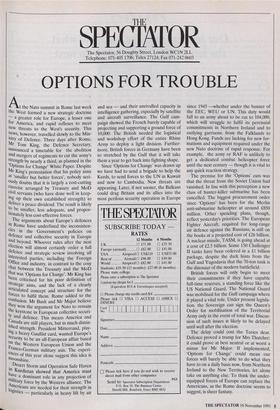THE
SPECTATOR
The Spectator, 56 Doughty Street, London WC1N 2LL Telephone: 071-405 1706; Telex 27124; Fax 071-242 0603
OPTIONS FOR TROUBLE
At the Nato summit in Rome last week the West formed a new strategic doctrine — a greater role for Europe, a lesser one for America, and rapid reflexes to meet new threats to the West's security. This news, however, travelled slowly to the Min- istry of Defence. Three days after Rome, Mr Tom King, the Defence Secretary, announced a timetable for the abolition and mergers of regiments to cut the army's strength by nearly a third, as planned in the Options for Change' White Paper. Despite Mr King's protestation that his policy alms at 'smaller but better forces', nobody seri- ously doubts that it is largely a cost-cutting exercise arranged by Treasury and MoD Fivil servants (who have done well in keep- ing. up their own established strength) to deliver a peace dividend. The result is likely to be smaller, less adequate, and propor- tionately less cost-effective forces. . The arguments about Europe's defences ill Rome have underlined the inconsisten- cies in the Government's policies on defence and collective security in Europe and beyond. Whoever rules after the next election will almost certainly order a full defence and strategic review involving all interested parties, including the Foreign Office and industry, in contrast to the cosy chat between the Treasury and the MoD that was 'Options for Change'. Mr King has been criticised for his poor definition of strategic aims, and the lack of a clearly articulated concept and structure for the forces to fulfil them. Rome added to the confusion. Mr Bush and Mr Major believe they won the argument for Nato to remain the keystone in European collective securi- ty and defence. This means America and C. anada are still players, but in much dimin- !shed strength. President Mitterrand, play- ing a heavy Gaullist card, wanted Europe's security to be an all-European affair based 2,11 the Western European Union and the t'ranco-German military axis. The experi- ences of this year alone suggest this idea is moonshine. . . Desert Storm and Operation Safe Haven ,in Kurdistan showed that America must nay.e a dominant role in any projection of ItAlibtary force by the Western alliance. The ;‘liericans are needed for their strength in logistics — particularly in heavy lift by air
and sea — and their unrivalled capacity in intelligence gathering, especially by satellite and aircraft surveillance. The Gulf cam- paign showed the French barely capable of projecting and supporting a ground force of 10,000. The British needed the logistical and workshop effort of the entire Rhine Army to deploy a light division. Further- more, British forces in Germany have been so stretched by the Gulf that it will take them a year to get back into fighting shape.
Since 'Options for Change' was drawn up we have had to send a brigade to help the Kurds, to send forces to the UN in Kuwait and now to Cambodia. New threats are appearing. Later, if not sooner, the Balkans could drag Britain and its allies into the most perilous security operation in Europe since 1945 —whether under the banner of the EEC, WEU or UN. This duty would fall to an army about to be cut to 104,000, which will struggle to fulfil its perennial commitments in Northern Ireland and to outlying garrisons, from the Falklands to Hong Kong. Funds are lacking for new for- mations and equipment required under the new Nato doctrine of rapid response. For example, the army or RAF is unlikely to get a dedicated combat helicopter force until the next century — though it is vital to any quick reaction strategy.
The premise for the 'Options' cuts was that the threat from the Soviet Union had vanished. In line with this perception a new class of hunter-killer submarine has been cancelled. The biggest procurement order since 'Options' has been for the Merlin anti-submarine helicopter at around £850 million. Other spending plans, though, reflect yesterday's priorities. The European Fighter Aircraft, required for long-range air defence against the Russians, is still on the books at a projected cost of £26 billion. A nuclear missile, TASM, is going ahead at a cost of £2.5 billion. Some 150 Challenger II tanks have been ordered in a £1 billion package, despite the dark hints from the Gulf and Yugoslavia that the 70-ton tank is the dinosaur of the modern battlefield.
British forces will only begin to meet their commitments if they have capable full-time reserves, a standing force like the US National Guard. The National Guard was mobilised for the Gulf campaign where it played a vital role. Under present legisla- tion, the Sovereign can sign the Queen's Order for mobilisation of the Territorial Army only in the event of total war. Discus- sion of such issues is likely to be delayed until well after the election.
The delay could cost the Tories dear. Defence proved a trump for Mrs Thatcher: it could prove at best neutral or at worst a minus for Mr Major. If implemented, 'Options for Change' could mean our forces will barely be able to do what they have to on a daily basis now, from Northern Ireland to the New Territories, let alone take on anything else. To think the under- equipped forces of Europe can replace the Americans, as the Rome doctrine seems to suggest, is sheer fantasy.










































































 Previous page
Previous page